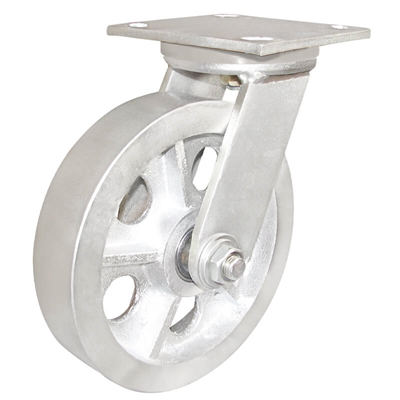Caster wheels are essential components used in various applications to enable the movement of equipment, machinery, and objects. When it comes to rigid caster wheels, these wheels are designed to provide stability and controlled direction in a single fixed direction, without swiveling. Here’s an overview of caster wheels in the context of rigid caster editions:
1. Wheel Materials:
- Polyurethane: Polyurethane wheels offer excellent load-bearing capacity, durability, and resistance to wear and tear. They are often used in indoor applications and provide smooth, quiet operation.
- Rubber: Rubber wheels provide good shock absorption, making them suitable for uneven surfaces. They are often used in medical equipment and applications where floor protection is essential.
- Cast Iron: Cast iron wheels are exceptionally robust and suitable for heavy-duty applications, such as foundries and manufacturing plants. They can withstand high temperatures and heavy loads.
- Steel: Steel wheels are durable and ideal for extremely heavy loads. They are used in demanding industrial applications, including those with rough terrain or debris.
2. Load Capacity:
- Caster wheels come in various load capacity ratings to accommodate different equipment and loads. It’s crucial to select caster wheels with the appropriate load capacity to prevent overloading and maintain stability.
3. Wheel Diameter:
- The diameter of the wheel affects load distribution, mobility, and the ability to roll over obstacles. Larger wheels provide better load distribution and mobility, making them suitable for heavy loads and uneven surfaces.
4. Bearing Type:
- Caster wheels can feature various bearing types, such as ball bearings, roller bearings, or precision bearings. These bearings affect the ease of rolling and the overall maneuverability of the wheels.
5. Brake Options:
- Rigid caster wheels may come with various brake options, such as total lock brakes or side lock brakes, to immobilize the wheels when needed.
6. Wheel Tread Design:
- The design of the wheel’s tread can vary, offering different levels of traction and resistance to wear. Various tread patterns are available for specific applications.
7. Noise Reduction Features:
- Some rigid caster wheels are designed for noise reduction and smooth, quiet operation. These are often used in environments where noise control is essential.
8. Floor Protection:
- Caster wheels can be designed to protect the floor from scuffs and marks, making them suitable for indoor environments with delicate flooring.
9. Specialized Applications:
- Certain caster wheels are designed for specialized applications, such as high-temperature environments, corrosive conditions, or settings with strict cleanliness requirements.
Caster wheels, whether used in rigid or swivel configurations, play a significant role in a wide range of industries and applications, including manufacturing, healthcare, warehousing, and transportation. Choosing the right caster wheels for a specific application is essential to ensure optimal performance, safety, and durability.


